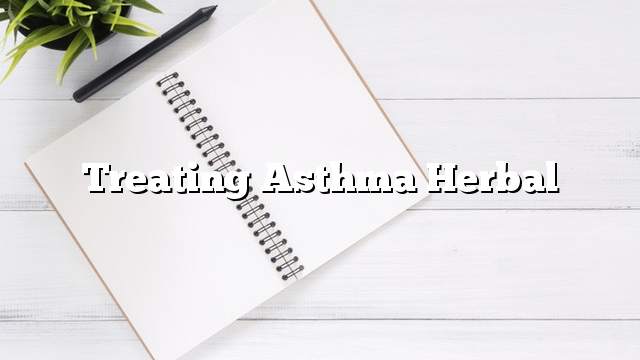The goal of asthma treatment
- Control the symptoms of the disease
- Prevent asthma complications
- Maintain the lung function by being as close to normal as possible.
- Avoid the side effects of the drugs used.
- Avoid reversible obstruction.
Types of asthma treatment
Drug therapy
There are many medications used for this and are taken after consulting a doctor
Treatment with general advice
- To understand the patient and his family about the nature of his illness and treatments and everything related to it
- Stay away from smoking
- Avoid all irritants and triggers as much as possible
- Avoid medications that make the disease worse, such as anti-inflammatory drugs (NSAIDs)
Alternative medicine treatment
Thyme
It is used against coughing and asthma. It is boiled with a teaspoon of boiling water. It is left for 10 minutes and then drinks one cup after each meal.
Ephedra spp
It is a herbaceous plant that is found in the form of a bunch of branches. This plant uses all the parts above the surface of the soil. Ephedra spp contains ephedrine, alkaloids, and is the oldest and most popular drug used to treat bronchitis and asthma. It has been used in China for more than 5000 years and is still being used to the same day. It is undoubtedly one of the oldest drugs used in the world. for this purpose.
Beginning in 1887, American scientists began to disperse these compounds as a treatment for asthma and other respiratory problems.
The powder is sold around the world as it is, a teaspoon of powder is taken and added to a cup of boiling water, left for ten minutes, then drunk once in the morning and another in the evening. Adjuvant should be given to children only after consultation with the specialist and not used by pregnant and lactating women.
Aniseed and Fennel
It is known that there is no such thing as anise, and it is not unusual to have a home of the fruits of these two aromatic plants. The Greeks used tea from these two herbs to treat asthma. These plants contain chemicals known as crisol and fapainin, which help to expand the air passages and remove the secretions in them. Fennel is more useful than anise, and one teaspoon of boiling water is used in the cup. Place in the cup after filling it with boiling water, leave for 10 minutes covered, then drain and drink once in the morning and another in the evening. Anise can be used if not available fennel.
Licorice
It has been used for hundreds of years for the treatment of sore throat, cough and asthma. Licorice is a very safe drug. Three cups can be used safely every day. At a rate of three times a day but high pressure patients should not use it as it raises blood pressure.
Ginkgo
Asians used the extract of ginkgo leaves for long years to treat asthma, allergies, bronchitis and cough. Ginkgo has become famous in the West because of its great utility in circulation of the elderly, regular circulation of the brain, as well as its counteracting stroke. Ginkgo leaves are widely used to treat asthma. The active ingredient in ginkgo leaves is a chemical compound called Ginkgolides. Ginkgo extract is found in most complementary food stores, and between 60 and 240 milligrams of this feed is taken once a day.
Eucalyptus or Camphor
The active part of this leaf plant, the active substance in camphor leaves is the oil, as the leaves contain a protein compound, as well as bioflavonoids, which are responsible for reducing inflammation in tracheal passages. The fresh or dry eucalyptus leaves are taken in five tablespoons, placed in a bowl and added to two liters of boiled water. The asthmatic patient is placed over the container, inhales the vapors from the container and puts a lid over the head to keep the vapors from leaking out. and you can drink of about a cup of this boiled.
Onions
The onion is used to treat asthma by taking a quantity of onions and cutting it in the form of very thin slices, then put in a pot and add twice the size of pure honey, and leave the mixture after a good well for 24 hours, and then take a tablespoon at the rate of four times a day, or squeeze the onions and take a tablespoon and mix well with a tablespoon of honey, and taken every three hours, and then every six hours.
Vitamin B6 (vitamin B6)
“The use of vitamin B6 at a daily dose of 200 mg per child reduces the rate of asthma medication used in children,” says Professor Melvin, a clinical professor at the University of California, Los Angeles, the author of many alternative medicine books. “For adults, the 50 mg dose of vitamin B 6 twice a day is very useful to reduce asthma crises, and consult with the specialist before using this vitamin next to asthma medications.
Seeds of flax
Foods rich in omega-3 fatty acids, such as fish meat, almonds and linseed, help reduce respiratory problems, researchers at the State University of New York say.
Many people rely on different types of herbs to treat asthma, but there are not enough studies to prove the effectiveness of these herbs to asthma.
Other topics about asthma
- Oxford handbook of clinical medicine 8th edition
- Dvidson’s principles and practice of medicine 21st edition
